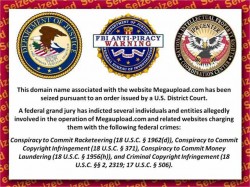Weekly News Roundup (3 June 2012)
How are you doing on this fine Sunday? Hope you’ve had a good week, and again, apologies for the slight lateness of this WNR.
Back in March, I wrote about an incident involving DMCA notices filed against two URLs hosted on this website. In the last few days, I’ve been contacted by Mr. Getman from Guardlex, and he was kind enough to take time and explain just what had gone wrong. I will post an addendum to the original article in due time with more details, but as I tried to explain in the original article (perhaps not successfully, and also fueled by strong emotions at that time), I don’t really blame Guardlex, certainly not Cyberlink, and not even Google. If anything, my beef is with the bigger issues of how DMCA take-downs can be misused, in my case innocently, but there’s also plenty of evidence to suggest that less scrupulous individuals are certainly taking advantage. It’s an imperfect system, and Cyberlink, Guardlex and Google all have to work within this imperfect system. As a content creator though, I also know that it is sometimes the only weapon available. Once I write the addendum, I will also take a brief look at some possible ways the DMCA take-down system can be improved to avoid this kind of errors.
As for news, it was a pretty light week, and I struggled pretty badly to find items of interest. The US Memorial weekend may have had something to do with it.

We really only have copyright news this week, so let’s get started. With copyright groups still celebrating their “victory” against The Pirate Bay, now that many European countries have decided to allow for the censorship of the BitTorrent indexer, The Pirate Bay has signaled it is ready to adopt a new strategy.

The Pirate Bay is willing to use 100s of IP addresses to keep anti-piracy agencies busy trying to force ISPs to block these new addresses
When TPB released a new IP address that redirects to a proxy friendlier version of the website, what they may not have realised was how difficult it would be for copyright groups to have this new IP address added to the censorship list. ISPs, already not too happy at having to implement the filter in the first place, rejected Dutch anti-piracy group BREIN’s attempt to get the new IP address added without the relevant court order, and forced the group to go through the full legal process to have it done. What then became apparent was that every time TPB releases a new IP address, it could take days for the IP to be banned – BREIN would have to seek a court order to do it every time, and in the meantime, there’s the added bonus that the IP address temporarily allows access to the banned website without the need for a proxy. The legal process to add a new IP address to the ban list will take time and money for BREIN, not to mention keeping the court busy at their annoyance, while on the other side, it may only take minutes to apply the new IP address to TPB. And so with nothing to lose, TPB has signaled they’re ready to continue adding IP addresses, even if it means adding hundreds or even more addresses.
This farce may very well play over 100 times, or however many IP addresses The Pirate Bay is able to obtain. Meanwhile, the futile nature of website censorship is on full show, and it might just annoy the courts enough to make them realise how ill thought-out this plan was in the first place. And all the time while BREIN and other groups play the whack-a-mole game, most people are still easily able to access TPB via the steadily growing list of proxy servers that have been set up since the ban.
Speaking of whack-a-mole, last week I talked about Google’s version of the game with its DMCA take-downs, but despite pulling down more than 1.3 million links every month, the RIAA still says Google isn’t doing enough. In fact, the recording industry’s copyright lobby says that Google has been restricting the number of notices they’ve been able to send, an allegation that Google denies. Considering the fact that Microsoft did manage to submit almost 10 times as many notices as the RIAA, it suggests that the RIAA’s assertions may not be entirely true.
But what the RIAA really want is to do the absolutely minimum required, and getting Google to do the rest. The RIAA admits that removing one page at a time is often a pointless exercise, as the exact same page might pop up on another link almost instantly. So their solution is for Google to seek and destroy any other links that are the same or similar enough and continue to do so (at Google’s expense, of course), so that the RIAA won’t need to re-send notices. The obvious problem with this approach, other than the fact that the DMCA doesn’t require Google to do it, is that it could be prone to false positives. And as Google are the ones removing the links, they may end up being liable for mistaken removals. The way I look at it, there’s no easy technical solution to the piracy problem – people are way too smart to let filters and automated removal tools to stop them from sharing pirated content. The solution is to make piracy irrelevant, by presenting a much better legal product, at a price that makes piracy more trouble than its worth. And the only ones that can come up with such a solution are the members of the RIAA (and members of other similar groups).

MegaUpload is hoping the judge agrees with their view that the US government has no jurisdiction over the Hong Kong based company
An update on the MegaUpload case. The lawyers for MegaUpload have asked for the entire case to be thrown out of court, due to what they say are jurisdictional issues. With the Hong Kong based file hosting company not even having an office in the US, MegaUpload’s defence teams says the government has no right to pursue the case at all against the company. But MegaUpload did have servers located within the United States, and its domain name is regulated by the same country, so the US government clearly believes that, while MegaUpload is a foreign company, the actual “criminal acts” were performed within the United States. I also doubt the government would go to so much trouble without first eliminating any jurisdictional issues. MegaUpload’s best hope lies in ensuring the government cannot prove that there was criminal intent behind the way they chose to operate the website, and hope the case goes to civil court instead.
Website filters, DMCA notices, lawsuits … none of them may even matter that much soon, as the researchers behind the decentralised BitTorrent client Triber has promised to add anonymous sharing in the next major version of the tool. I had hoped that this would be the next evolution of BitTorrent clients when I first wrote about Tribler back in February, but it was obvious to me that, thanks to mass lawsuits and graduated response that targeted public nature of BitTorrent sharing, anonymity would be the next major update to the protocol. The best thing about the promised Tribler update is that not only may it allow for un-monitored sharing, the same technique of adding a new proxy layer to the communication protocol may also bring in speed and efficiency improvements. So we might then have a totally decentralised, free and open-source BitTorrent client that doesn’t require a BitTorrent indexer (like The Pirate Bay), and can allow users to share files anonymously at faster speeds than ever before. Is this game over for BitTorrent anti-piracy? Probably not, but it seems headed that way.
Nothing much else to add to this WNR really, although a story came a bit too late for this edition involving a raid of Blizzard offices in South Korea, related to the botched DRM implementation that has left many gamers in the country unsatisfied and unable to seek a refund. I’m unsatisfied, mostly with myself, for not pre-ordering the game and now it’s sold out everywhere. My backorder doesn’t even have an ETA at the moment. Hopefully by the time I actually get the game, the server issues would have been resolved. See you next week.
